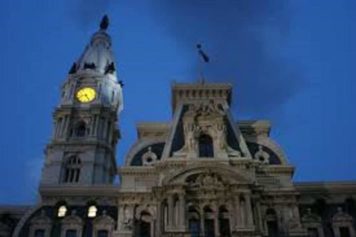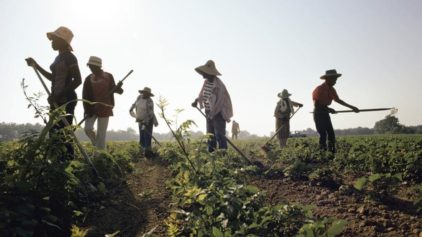Watching Franklin Saint slide deep into The Life on FX’s new drama “Snowfall” is fascinating because he doesn’t so much knowingly embark on a life of crime as make what is, frankly, a family business decision: He wants “freedom,” and, in America, that means having money, so … The show, set in 1983, details the how and why of the 1980s crack epidemic: greed feeding need and vice versa.
Things Were Changing Fast Back Then
“Snowfall” is the latest attempt of American popular culture to look hard at the 1980s and 1990s. Those two decades were a time where Black hope would peak and then fall. Jesse Jackson said he was running for president in 1984 and 1988 to fulfill Martin Luther King’s outsider legacy. Instead of creating that outside force from his Rainbow Coalition to take up Black and working-class demands and challenge the Democratic Party, he reinforced a new generation of Black political leadership solidly attached to the Democratic Party. In South Africa, a radical guerrilla struggle for African freedom succeeded and a former revolutionary leader, Nelson Mandela, became the president in 1994. That ‘victory’ was secured, however, with an agreement not to disturb white economic, social and military power in any major way. Hip hop, that newborn of a hundred American and African musical forms and the grandchild of African spirit, found its political and cultural legs, but those ideas became permanently blunted by a groundbreaking 1992 album called “The Chronic.” Dr. Dre and Snoop Dog ushered in the golden age of so-called “gangsta rap” that made a whole generation of youths take off their dashikis. Public Enemy, Arrested Development and Jungle Brothers, etc., and the cultural politics they represented all went out of vogue.
Sometimes, Things Fall Apart
James Forman Jr., a Yale Law School professor and the son of the Civil Rights movement icon, James Forman has a new book called “Locking Up Our Own: Crime And Punishment In Black America.” It’s about the role Black political leaders played in mass incarceration. He recently told NPR’s Terry Gross that Black people have always been concerned with all violence, not just when it is caused by police:
GROSS: You know, since the larger question in your book is asking us about how so many leaders of the African-American community came out for tougher measures against crime, helping to lead this era of mass incarceration, you’re also arguing against the claim that so many African-Americans focus on police crimes against Black people, but they don’t focus on Black-on-Black crime. You’re trying to dispel that idea.
FORMAN JR: I think when you look at the book, you will see page after page, year after year, decade after decade of agitation, of pleading, of demanding, of saying, “I don’t feel safe on my streets — not from police officers. That’s part of it. But, mainly, I don’t feel safe on my streets because there’s drug dealers on the corner. I can’t take my kid to the park after school because they’re shooting. And they’re leaving dirty syringes in the park. And nobody’s cleaning them up.”
Black Leadership Had No New Answers
Gloria J. Browne-Marshall, associate professor at the City University of New York’s John Jay College of Criminal Justice and a prominent author of several books on race and justice, explained the bind in which Black communities had found themselves trapped.
“Black politicians were given very few options. They did not have the resources — meaning the budgets for drug programs, counseling or control or any of the police and courts — to address this devastating situation in other ways. The churches and community centers that would have been there for victims were on the decline just as the Black middle class was moving to the suburbs. … Black prosecutors and judges [signed up] as law enforcers. If the criminal justice laws are written to the disadvantage of Black communities — and they are — these Black public servants are stuck underserving their own communities.”
In a perfect world, explained Marshall, Black communities would have had community programs and would not have accepted the approaches of those “who were intent on destroying their community.” She added, “However, without resources and a sense of the overall picture, any solution would have come up short.”
In “Snowfall,” Franklin Saint, a resident of the now-famous South Central part of Los Angeles, has no Black role model other than his drug-dealing uncle. Saint is a private school-educated college dropout who has a full-time job managing a local convenience store. He tries to hold onto his personal sense of morality while living in a local world devoid of compassion, and he wants to help his struggling mother.
A low-level dealer, the youngblood gets into the high-level game, appropriately enough, by acting as a gopher for one of his rich, white friends from high school. In his new book, Forman repeats the common knowledge of the American judicial double-standard when it comes to race:
“Blacks are much more likely than whites to be arrested, convicted and incarcerated for drug offenses, even though Blacks are no more likely than whites to use drugs. And although Blacks play a greater role in street-level drug distribution in most markets than do whites, the best research has shown that this doesn’t explain all the racial disparities in incarceration rates. Marijuana produces particularly blatant arrest disparities: In Washington, D.C., the Black arrest rate for marijuana possession in 2010 was eight times that for whites, and in that same year, law enforcement in the city made 5,393 marijuana possession arrests — nearly 15 arrests a day.”
The War is Over But What Have We Learned
Today, however, there is no longer a culture war between Black baby boomers and Black members of the hip hop generation; the former is now elderly and the latter is now middle-aged with children. The war between ancestors Delores Tucker, the civil rights activist, and rap legend Tupac Shakur has long been over. America has grown up on the drug issue. Marijuana is well on the way to becoming decriminalized and legal in many states. The new drug-use epidemic now has a white face to it and a different set of ideas on how to deal with users and dealers. Compassion is the buzz word from law enforcement and politicians and the tough-on-crime sentiment had simmered down, at least it had until the recent election of Trump.
But in soon-to-be gentrified urban centers, Black people who have paid their debt to society are still coming back to unemployment and underemployment, lack of proper education and 21st-century skills training. Black leaders today have a chance to make up for recent mistakes of the past and need to push for more than the “Urban Marshall Plan” they’ve asked the federal government for for at least three decades. They must pro-actively discover the new 21st-century industries that will hire poor and semi-skilled workers en masse and come up with new ideas on supporting Black communities, even when it is against the wave of popular sentiment. History does not stand still, but it often finds ways to repeat itself. If Black leaders don’t get in front of issues impacting the Black community, they will continue to align themselves with reactionary solutions that will double down on our pain and not move us forward.
——————————————————————————————————
TODD STEVEN BURROUGHS, Ph.D., is an independent researcher and writer based in Newark, N.J. He is the author of an audiobook, Son-Shine On Cracked Sidewalks, which deals with the 2014 mayoral election of Ras Baraka, the son of the late activist and writer Amiri Baraka, in Newark, N.J. The co-author with Herb Boyd of Civil Rights: Yesterday and Today and co-editor, with Jared A. Ball, full professor in Morgan State University’s School of Global Journalism & Communication, of A Lie of Reinvention: Correcting Manning Marable’s Malcolm X, he is currently co-writing a book, with Wayne J. Dawkins, an associate professor of Morgan State University’s SGJ&C, on Freedomways magazine.


